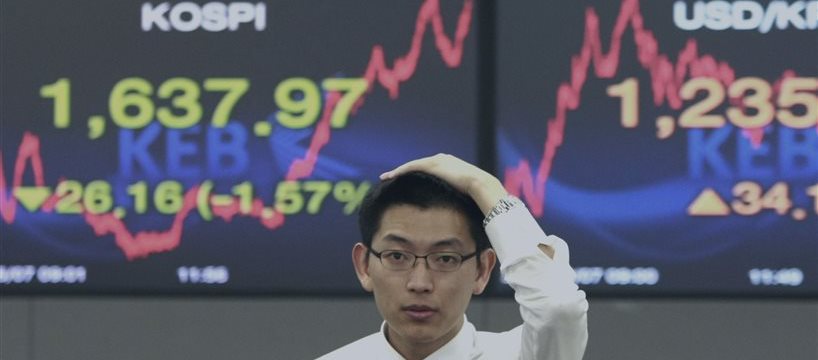Asian stocks dropped, with the
regional index heading for a third straight weekly loss, after
the Standard & Poor’s 500 Index dropped the most in almost two
months. The dollar rallied with sovereign bonds as the cost of
insuring debt against default climbed.
The MSCI Asia Pacific Index (MXAP) lost 1.1 percent by 2:29 p.m.
in Tokyo, as the Topix index dropped 1.1 percent from its
highest close since June 2008.
The MSCI All Country World Index is on course for a 3.2 percent decline in September, the biggest drop since January. All 10 industry groups on the Asia-Pacific gauge dropped today, led by materials producers and consumer-discretionary firms. The measure is heading for a 1.7 percent weekly loss and the lowest close since May 30.
South Korea’s Kospi index dropped 0.4 percent, while the S&P/ASX 200 Index fell 1.2 percent in Sydney. The Nikkei 225 Stock Average, which yesterday closed at the highest level since November 2007, retreated 0.9 percent in Tokyo today.
Hong Kong’s Hang Seng Index dropped 0.5 percent and is
heading for its biggest weekly loss since March, which was also
the last time the measure fell for three straight weeks. A gauge
of Chinese shares in the city retreated 0.5 percent, while the
Shanghai Composite Index was slipped 0.2 percent.
Indonesian stocks plunged the most in four months after the country scrapped direct regional elections. S&P 500 futures added 0.1 percent after the gauge slumped 1.6 percent. Australian 10-year bond yields fell nine basis points after U.S. Treasuries jumped the most in six weeks. The yen fell 0.3 percent and a gauge of Asian credit-default swaps headed for its biggest jump in eight weeks.
About $1.42 trillion has been wiped from the value of global shares this month amid concern Chinese economic growth is slowing and that U.S. interest rates may rise sooner than some investors are expecting. Japan’s inflation slowed more than estimated in August, highlighting the magnitude of the task facing Bank of Japan Governor Haruhiko Kuroda in his bid to spur inflation. Consumer-confidence data are due in the U.S., France and Germany.
“With investors scratching their heads over a catalyst for the decline, many are wondering whether this may or may not be the start of a bigger correction,” Andrew Wilkinson, Greenwich, Connecticut-based chief market analyst at Interactive Brokers LLC, said in an e-mail. It “reminds us just how absent volatility has been during the rally.”
The Chicago Board Options Exchange Volatility Index (VIX), known as the VIX, jumped 18 percent to 15.64 yesterday, the most since July. That’s 16 percent higher than its average this year. The Nikkei Stock Average Volatility Index climbed 1.4 percent.



